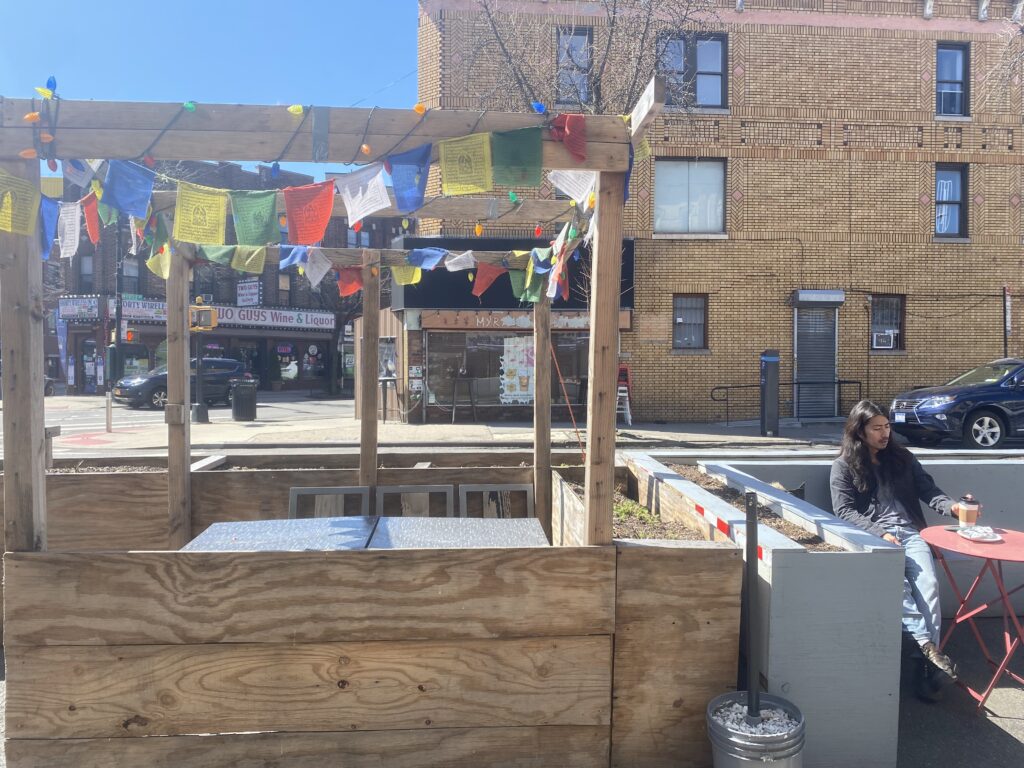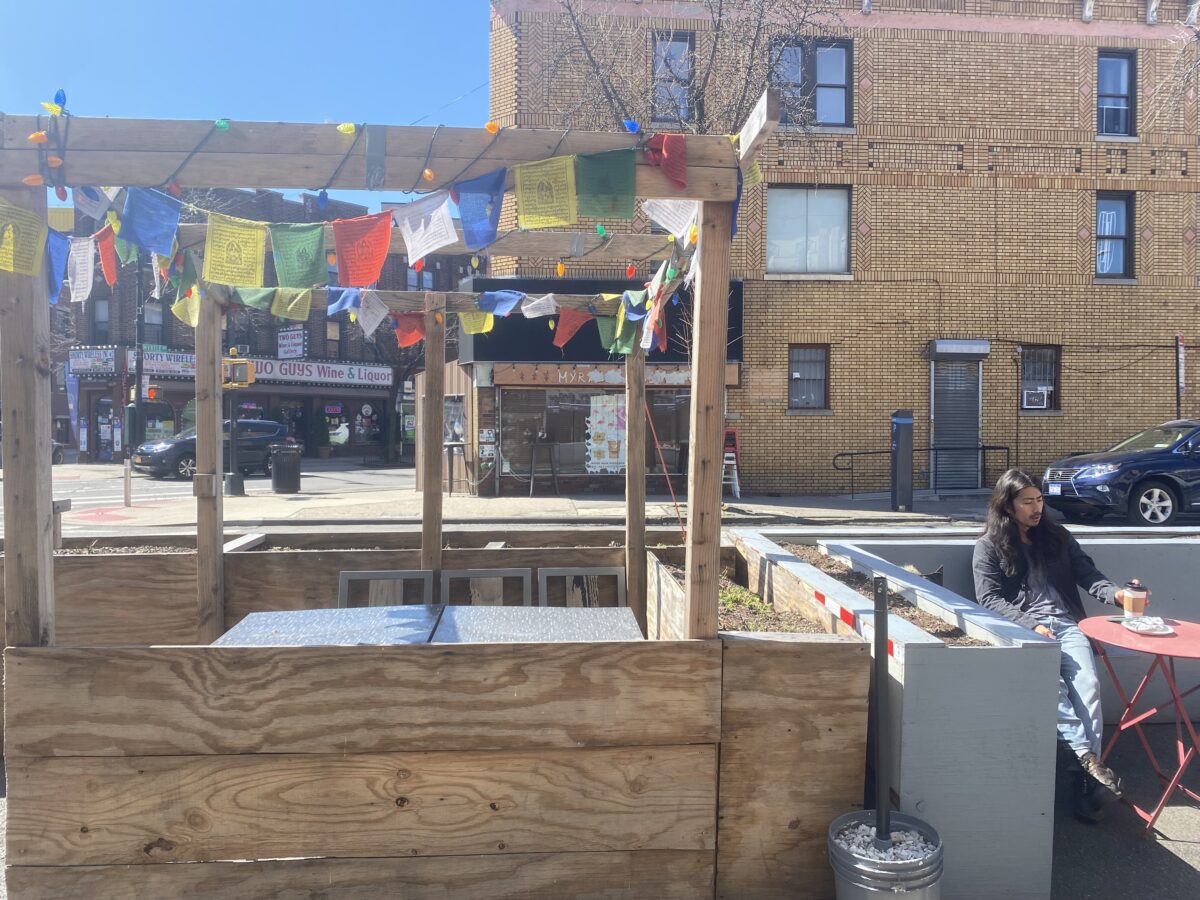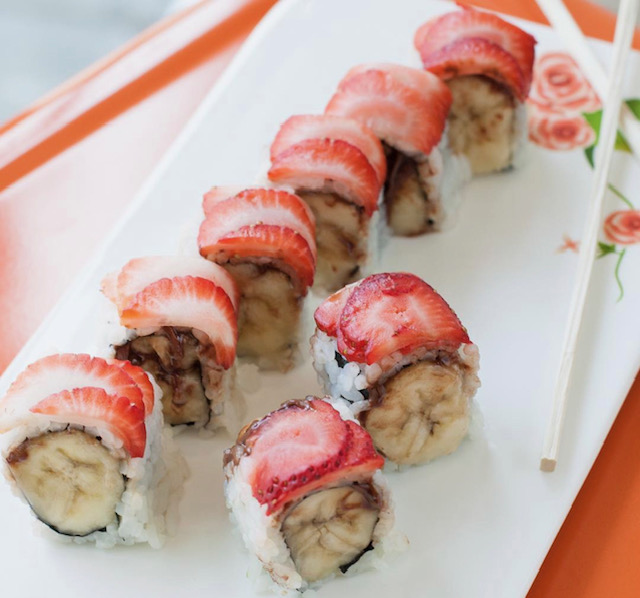Remaining Outdoor Dining Sheds ‘Eyesore’ to Some Residents

By Iryna Shkurhan | ishkurhan@queensledger.com
What started off as a lifeline for restaurants during the pandemic is now becoming a nuisance for residents and businesses alike.
Under the Open Restaurants program, 12,000 outdoor dining permits were issued by the NYC Department of Transportation (DOT) which allowed restaurants to construct and place structures on the streets, given they follow some guidelines.
Even the simple sheds, generally constructed with plywood and nails, cost several thousand dollars and required even more in maintenance costs, according to restaurant owners that spoke with the Queens Ledger. The more extravagant structures, built with sturdy materials and decorated to the nines could climb over tens of thousands of dollars.
Some community members complain that sheds are falling apart after not being utilized or maintained, creating eyesores for the neighborhood. But the steep cost involved in maintaining these structures, combined with overall rising costs of food and other necessities, is posing a challenge for businesses.
The DOT says that “The City is committed to retaining the temporary program until the permanent program is in place,” according to their website that was updated in March. No further timeline on a permanent open restaurants plan that is currently “in development” has been unveiled.
“Some of the sheds that are out there now are ugly and just an eyesore,” said Theodore Renz, a Queens Community Board 5 member. “I hope that the criteria that they come up with is something that is aesthetically pleasing to the community, and at the same time is cost effective for the restaurant.”
Some restaurants said that given the opportunity, they will keep their dining sheds up permanently. Especially for businesses with limited indoor space, an outdoor area can be crucial for servicing more customers and providing them with other options.
“It really, really, really helped our business. I don’t know if we could have survived without it,” said Jackie Gorzelnik, the owner of Plein Air cafe in Ridgewood on the impact of outdoor dining when her business opened during the pandemic.
“It’s not fancy. It’s very utility. And to maintain it, it’s just like a coat of paint here and there,” said Gorzelnik, who reported that the outdoor structure cost a couple thousand dollars to build, and another couple thousand for a rebuild.
While she says that issues such as graffiti and rodents entering the space occasionally arise, the benefits of having more space outweigh the negatives.
The owners of While in Kathmandu, a Nepali restaurant in Ridgewood, dealt with the same issues when they had their shed up. They also struggled to deal with noncustomers who would congregate in the shed and utilize free electricity. Loiterers did not leave the space better than they found it.
Bikash Kharel, the manager and co-owner, says they took down their outdoor dining hut on the sidewalk two months ago because they felt it was no longer necessary, especially since they have a backyard. But they said that the removal process was just as difficult, and costly, as the installation.
“I did start noticing that it was falling apart in some ways because it was not utilized every single day. It was not taken care of in the best possible way,” said Kharel.
During a DOT inspection, the department inquired about whether the structure was still being utilized and offered to remove it within a week if it wasn’t being used anymore. After Kharel agreed, his team began to dismantle the shed and removed the roof and lights in preparation. But four weeks later, the DOT still had not arrived to complete the removal.
“I finally got to speak with somebody and they told me that we are on the line to be processed for it but it’s not going to be anytime soon. Maybe two or three months,” recalled Kharel. “So that left us in a limbo. Do we wait for the city to come to do it or do we experience a hazardous situation where something might happen.”
With the aesthetic of the restaurant in mind and a half broken shed out front, they decided to proceed and dispose of the entire structure themselves. With the cost of labor and rental equipment combined, the total price of removal exceeded a thousand dollars.
“But this is all about the socio-economics of the restaurant,” said Kharel. “The more upscale places have been able to maintain really nice beautiful looking locations versus restaurants that are not in the same demographic. They’re making that kind of money to spend that kind of money.”
One Ridgewood business owner with an outdoor structure, who wants to retain anonymity, says that their neighbor’s hut is an eyesore for the block. They complained that a lack of maintenance and adherence to code is spilling over into their hut, that is meticulously maintained and invested in.
They also complained that the neighboring business owners do not discourage non paying individuals from using the space to sit and smoke, which is not allowed under DOT guidelines.
“By participating in the program, you are taking responsibility for maintaining the cleanliness of the roadway curb space in front of your business,” reads the DOT guidelines. “Smoking and electronic cigarette use is not allowed in outdoor dining areas.”
According to the DOT, inspectors will make both proactive and complaint-driven visits to restaurants part of the program. Typically they do not require interaction with the business owner.
“I would say it is a responsibility of the business owner to maintain the structures and make them clean and rodent proof,” said Gorzelnik. “That’s our responsibility. That’s not on the city.”
Without significant snowfall this past winter, many sheds remained outside for longer than ever. The wear and tear is showing on many, especially when graffiti is also present.







